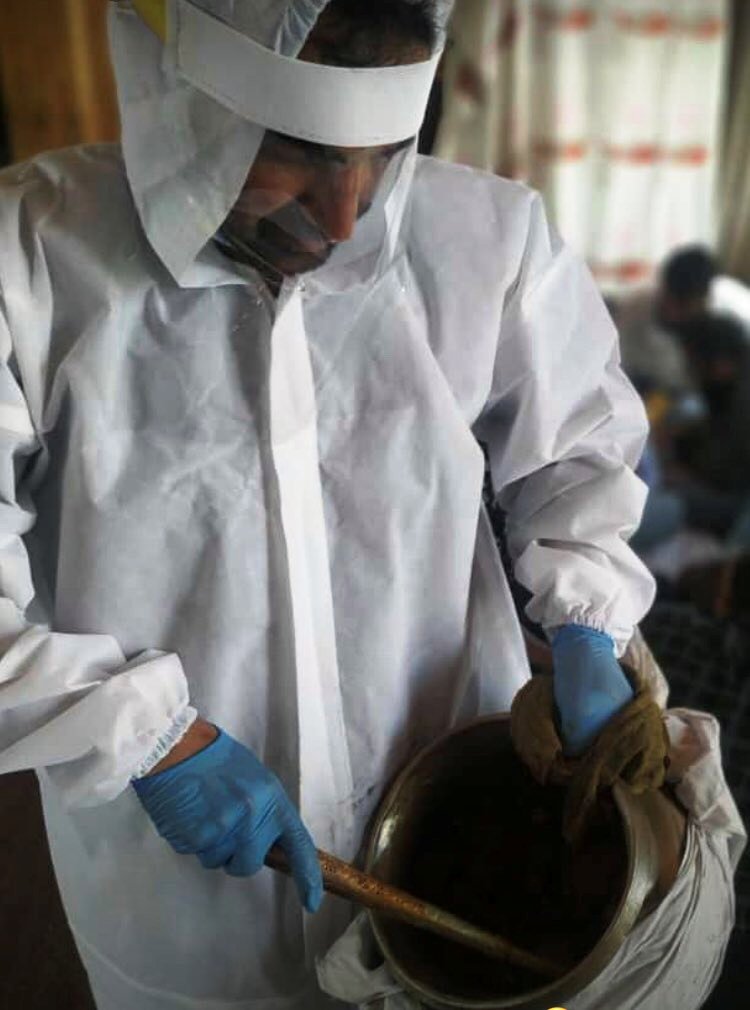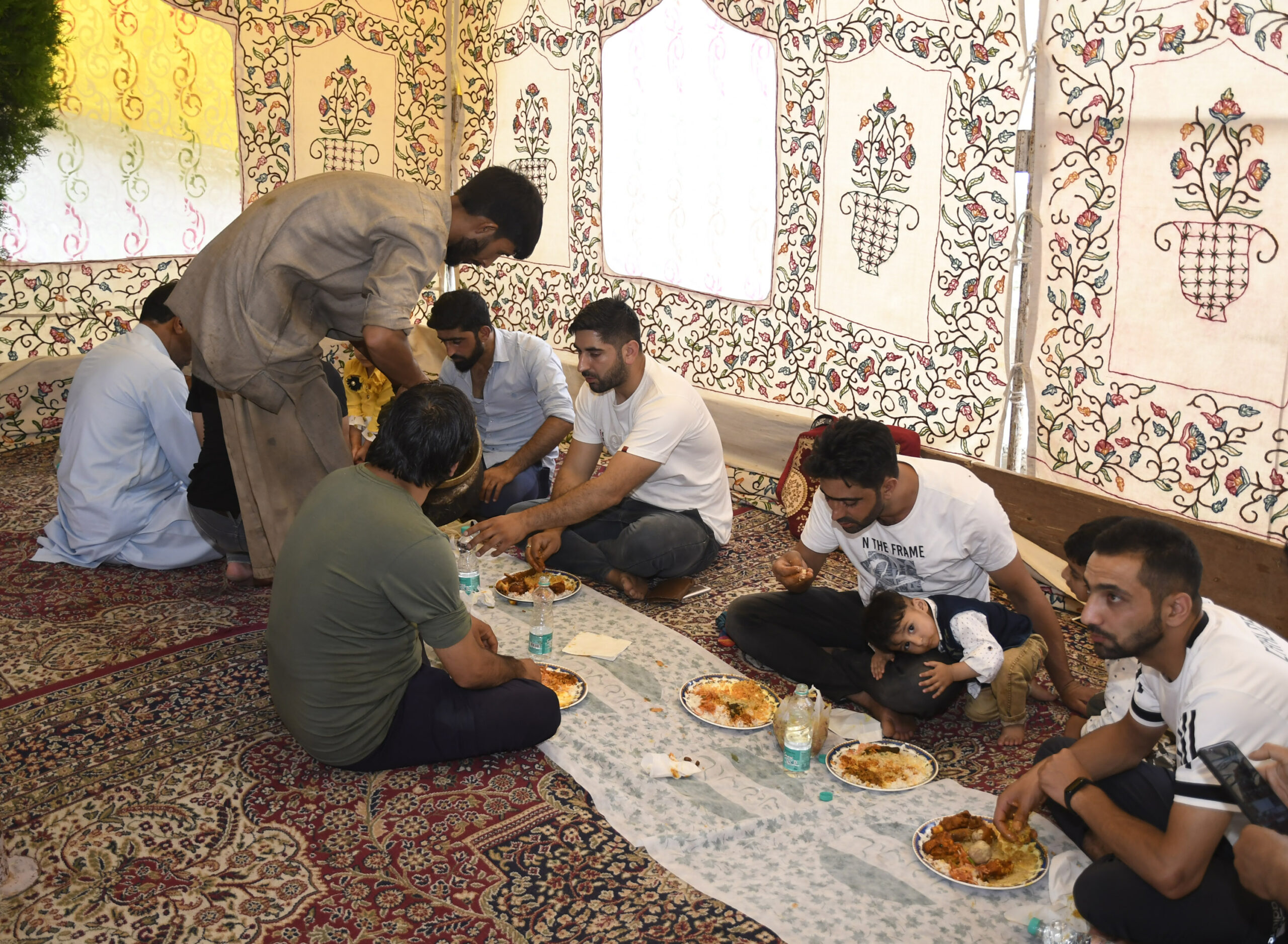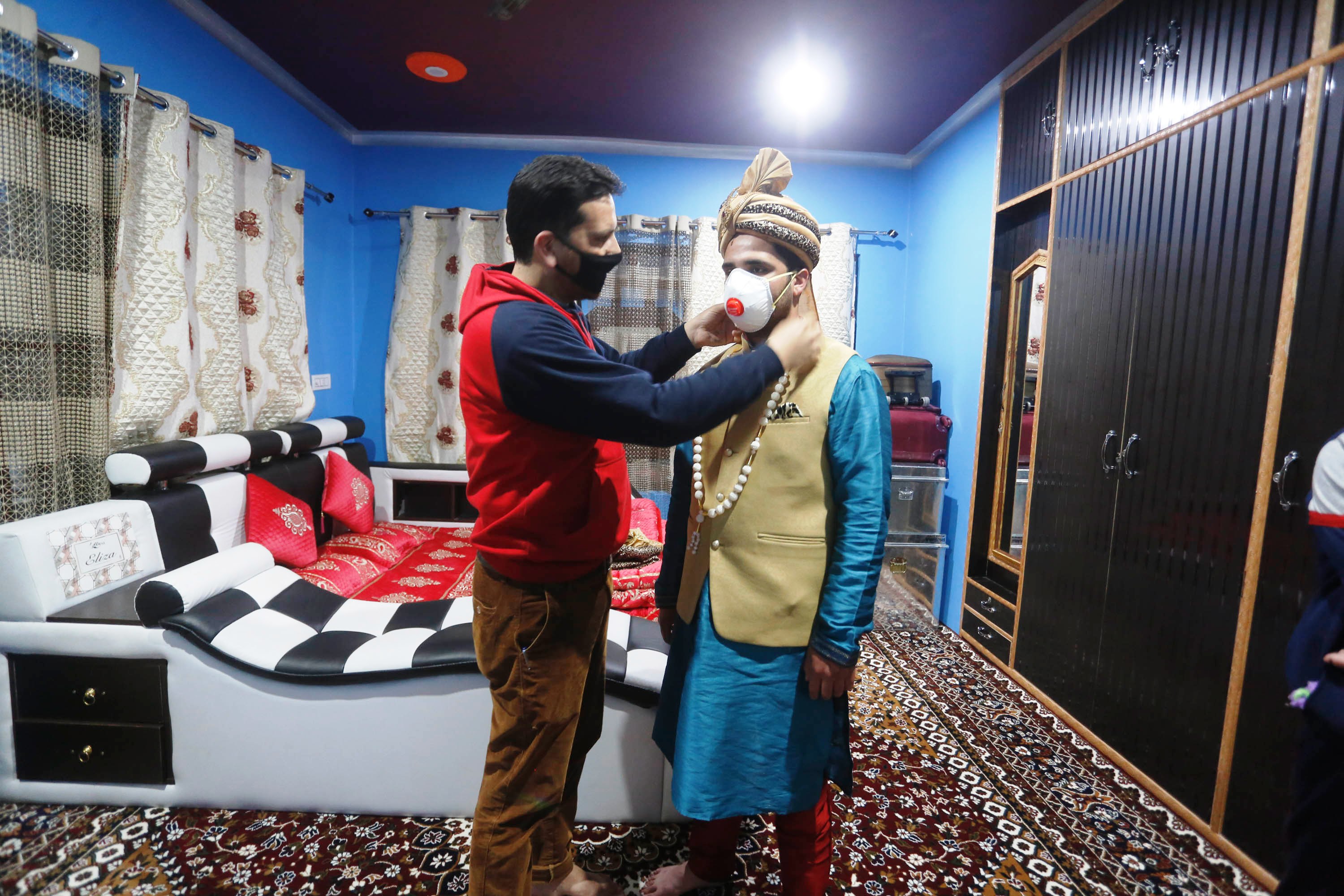From a big, fat affair, the Kashmir marriages have become an austere affair as people adjust to the health guidelines in view of the pandemic, reports Khalid Bashir Gura

Not health workers alone, the Covid-19 has forced even Waza’s – the traditional Kashmiri chefs – have to wear the personal protection gear before serving the mutton novelties to the guests.
Amid the pandemic lockdown, the wedding industry across Jammu and Kashmir has been severely hit with several stakeholders sustaining huge losses. The contagion has forced families to scale down the celebrations, dashing hopes of grand ceremonies which involved a massive expenditure. Amid Unlock 2.0, the shops in Srinagar dealing with the wedding items present deserted look on the alternate days they are allowed to open shops. The customers are few compared to previous years when the markets were abuzz in the season of marriage.
Kashmir’s marriage season starts in spring and ends by late autumn. Traditionally extravagant and colourful, the weddings do not just bring joy to families involved in it but also to those whose livelihood depends on the lavish ceremonies.
In otherwise bustling, aroma filled market of old city’s Maharaj Bazar, Mudasir Ahmed owns a shop of disposable items required in weddings and dry fruits. The successive lockdowns, he says, has killed his business.
“The shops have been closed since August 2019 as Kashmir was put under security and communication clampdown. In winters our work is usually down and we expected this year to compensate for our losses,” said Ahmed who has had to close shop again in March after the first Covid-19 case was detected in Srinagar. “As the restrictions have been eased a little, gradually our work is reviving though low in comparison to yesteryears.”
Similarly, in South Kashmir’s Pulwama district, Hilal Ahmed Dar’s camping agency and cutlery shop have been shut for the better part of the past year. He spoke to Kashmir Life after attending a condolence meeting of a friend who had committed suicide by jumping into the river. “He also belonged to the same profession and was like me and many of us. Out of work for a year had plunged him into depression,” Dar said.
Hilal says he hasn’t earned anything in last more than a year. “I have a bank loan, the interest accrues and the work is nowhere. I subsist on hope. But I continue to pay workers,” he said.

Due to Covid, the wazwan is served on separate plates rather than on tramis. Image Source: Internet
His views are echoed by Owais Ahmed in Srinagar who too owns a camping agency and deals in tents, and copper cutlery. He says that with the onset of spring his items used to be booked till October.
“The large copper plates are being replaced by small individual plates. Our items along with us are idle and gathering dust. Very few people pitch tents as large gatherings are disallowed,” said Owais who said even during last year’s lockdown marriages were organized helping them earn. “But the virus has made everything untouchable. I hope this is a temporary phase and people revert to traditional weddings.”
During marriages and other events, families buy copper made items like Samovars (copper tea kettle), utensils, etc to gift the bride.
Suhail Ahmed, a coppersmith in Srinagar has the same tale to narrate. The pandemic lockdown, he said, has impacted his work equally as he can sense the downfall in demand for copper goods.
Likewise, the gold jewellers have not skipped the impact as the people have taken to survival and saving mode. “The purchasing capacity of people has gone down,” said Muhammad Baba, one of the jewellers from Srinagar whose shop used to brim with customers during wedding season. “Gold plays an important role in a Kashmiri marriage during pre-wedding rituals to the wedding and other ceremonies where it is gifted by family members and relatives”.
But Baba receives fewer orders now. “As the prices of gold have spiked and the people’s earning has fallen, the business of gold jewellery has nosedived,” he said. People are postponing marriage events citing lack of money as the reason. “Once the couples choose each other, a series of events are held that cost a lot. The families of bride and bridegroom exchange gifts in which jewellery forms an important part” said Mushtaq Ahmed, a relationship manager whose work has also gone down due to successive lockdowns and pandemic as these days people prefer simpler ceremonies.
Muhammad Amin, a traditional chef (waza), said he has no work.“Honestly, I would not have had the time to talk; I would have been preparing and serving dishes had the pandemic and successive lockdowns not rendered us idle,” said Amin, a chef from downtown Srinagar. “We are seasonal workers and by working in summers we save money for winters when the work is low.”
Amin now gets two to four working days a month. Commenting on the recent social trend unleashed by the Coronavirus Amin said: “I recently cooked at a modest wedding where I followed norms that I had never imagined in my dreams: wearing gloves, masks, PPEs and serving food on individual plates.”
The chefs are linked to feasts and Kashmir has always remained a Wazwaan country. It is all about mutton. Farooq Ahmed Matoo, one of the butchers in Srinagar who reopened his shop in June, said the consumption level has gone down with usual customers as well as in marriage ceremonies. “The people who had booked for hundreds of kilograms of mutton for wedding ceremonies have reduced their order to 30-50 kgs. It is a huge loss to us,” said Mattoo.
Mehraj-u-din Ganie, the general secretary of the All Kashmir Wholesale Mutton dealers, said: “The mutton is already getting unaffordable with prices rising”. Last year, in its preliminary report, the KCCI had estimated economic loss worth Rs 18,000 crore between August and November in 2019. If we go by the same estimate, Kashmir’s economy would have suffered a loss of over Rs 55,000 crore from January till June this year.
“Marriage season forms an important part of the business,” said Sheikh Ashiq, president of the Kashmir Chamber. “A lot of business is linked to rituals in the marriage directly and indirectly. Even though people shop but the purchasing capacity has gone down.”
Modest Marriages
Traditionally, crochet tents are pitched in lawns to accommodate the guests as customary cuisine – wazwan – is served on and shared by four guests from each of the large copper plates called trami placed on dastarkhan (tablecloth). Guests gather women sing in groups and other rituals are followed during elaborate and expensive marriage ceremonies.

A groom being seen off for his wedding in Bandipore in late April 2020. The belt then had multiple Coronavirus (Covid-19) Red Zones and highest number of Covid-19 patients. Photo Shuaib Masoodi, The Indian express
In South Kashmir’s Anantnag, Muneem Farooq, 29, who got engaged in January, two months before the first person tested positive in Kashmir was happy till the pandemic marked its presence in Kashmir and severe lockdown upended his plans and dreams. Muneem and his family had planned for a big fat wedding in April, thereby leaving less time for marriage preparations.
“The preparations began with the booking of the wazas, we paid in advance to mutton sellers. We also booked tents, cutlery, decorations for the occasion and printed invitation cards, some of them distributed in March,” said Muneer whose stack of undelivered cards is a grim reminder of his subsequent austere wedding. The wedding was supposed to be a huge celebration with about 600 guests coming from different parts of the Valley and the country but virus upended it all.
First, the family was forced to defer the ceremony and later scaled it down to immediate relatives amidst raging pandemic. On May 30Muneem married Muneera Rasool. The marriage was modest.
“There were 20-30 guests on the day of marriage. Most of my friends witnessed marriage virtually even though they were invited but due to nationwide lockdown they could not travel,” regrets Muneem who plans to hold a grand ceremony after the pandemic ends. “We have not taken back the advances we had paid.”
Dr Suneem recently attended the wedding at Srinagar’s Chanapora of his first cousin and was happy to see the safety precautions being followed by the family. “We had sought the permission of DC Srinagar for the wedding. The family beforehand consulted some doctors about dos and don’ts in the wedding and how to strictly adhere to precautions,” said the doctor. “It was the strangest thing I ever saw in my life. The wazas served wearing Personal Protective Equipment (PPE) kits with eyewear, mask, gloves like an alien serving the food. What astonished guests were that the food was not served in trami but in individual plates.” People, he said, were with measuring tapes to make sure guests maintained a social distance in the banquet hall. “They ensured the distance between two people in the hall is more than six feet.”
On the wedding days as a lot of people visited, the hosts served people in instalments and the guests were conveyed politely that after finishing the lunch they should leave swiftly to make way for another group and avoid overcrowding.
“The food was served in six instalments on the wedding day and people came and kept on leaving,” said Dr Suneem.
The bridegroom was accompanied by ten people who were received without customary handshakes and hugs and only smiles were exchanged. “The bridegroom was wearing an N95 mask and the procession was made to adhere to social distancing norms. The food was served individually and the hand sanitizers accompanied the menu,” recalled Suneem.
from Kashmir Life https://ift.tt/3fYszd7
via IFTTThttps://kashmirlife.net
No comments:
Post a Comment